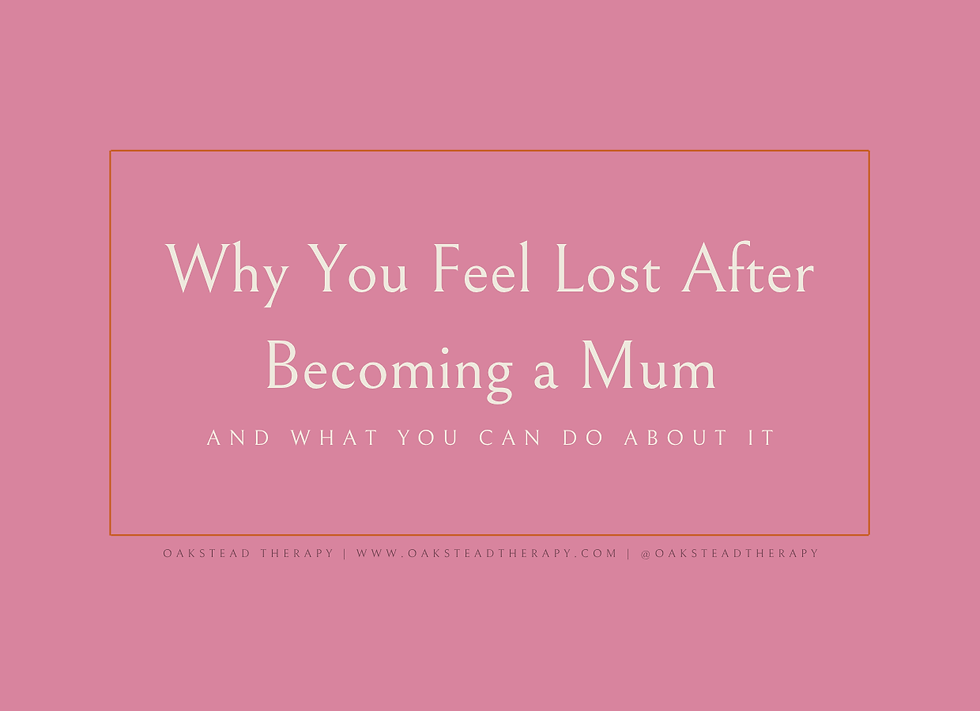How Parenting Can Change Your Relationships (And What to Do About It)
- Claire Smith

- Jul 14, 2025
- 4 min read
Updated: Aug 18, 2025

Becoming a parent can be one of the most beautiful, transformative, and disruptive experiences of your life.
Suddenly, you're responsible for a tiny human who needs you constantly. Your time, energy, priorities - and even your sense of self - shift in ways that no one fully prepares you for.
But one of the less talked-about changes?
Parenting can fundamentally shift your relationships - with your partner, your friends, and your family.
And those changes can feel lonely, confusing, and even painful.
In this blog, we're unpacking how parenting impacts your closest relationships, why these shifts happen, and how to navigate them with more clarity and compassion.
Why Do Relationships Change After Parenthood?
The short answer? Because you change.
Your needs, your routines, your capacity, your emotional bandwidth, all of it is affected. And when one person in a relationship experiences a major shift, the dynamic naturally changes too.
Add in sleep deprivation, hormonal changes, identity shifts, and the never-ending demands of caring for a child - and it's no surprise that your relationships might feel strained, disconnected, or just different.
Parenting & Romantic Relationships: Why It Changes and Gets Harder to Connect
For many couples, the transition to parenthood brings a whole new set of challenges:
Common Changes:
Less quality time together (or any time at all)
More logistical conversations (who's doing drop-off, who's cooking dinner) and fewer emotional or intimate ones
Increased tension due to exhaustion, miscommunication, or feeling unappreciated
Changes in desire, affection, or emotional availability
Feeling like you're co-managing a household rather than sharing a partnership
You might start to feel more like flatmates or teammates than lovers. Resentment can quietly build when one partner feels they're carrying more - emotionally, mentally, or physically.
What Helps:
Regular check-ins (even 10 minutes of undistracted conversation can make a difference)
Clearer communication about needs, not assumptions
Naming the mental load - and actively sharing it
Remembering affection doesn't have to be grand - small acts of care matter
Couples counselling (yes, even when things aren't "bad")
Parenting & Friendships: Why It Changes and Why You Might Feel Disconnected or Left Behind
Parenting can be incredibly isolating - especially when your friendships no longer reflect the same life stage.
Common Changes:
Friends without kids may not fully understand your new reality
Friends with kids may have different parenting styles, schedules, or energy
You cancel plans (again), and start to feel guilty or like a "bad friend"
The emotional energy to maintain friendships often takes a backseat
You may grieve old friendships, feel resentment toward friends who seem "free", or wonder why you feel so lonely even when you're constantly with your child.
What Helps:
Normalising that friendship seasons change - and that doesn't mean they're over
Seeking new connections with people who "get it" (e.g., mum groups, community events)
Letting go of relationships that feel one-sided or draining
Reaching out with honesty: "I miss you. Life's been full on. Can we reconnect soon?"
Parenting & Family Relationships: Why It Changes and When Old Wounds Resurface
Parenthood has a sneaky way of bringing up your own upbrining and family dynamics - sometimes gently, sometimes not.
Common Changes:
You start reflecting on how you were parented, and how you want to do things differently
You may feel frustrated with your parents or in-laws for offering unsolicited advice
Boundaries become more important - and sometimes more difficult
You might feel triggered by family members who dismiss or judge your parenting choices
Suddenly, you're not just a daughter or sister - you're a mother now too. And that can shift everything.
What Helps:
Being clear about your parenting values and communicating your boundaries early
Reminding yourself: You don't owe anyone access to your child or your time
Processing complex family dynamics in therapy, especially if old wounds are reopening
Giving yourself permission to redefine relationships in this new chapter of life
Why These Changes Can Feel So Lonely (But You're Not Alone)
One of the hardest parts about all of this?
It's rarely talked about openly.
People prepare you for the sleepless nights, the nappy changes, the feeding schedules.
But no one really talks about the grief of losing parts of your old life, the strain in your marriage, the drifting friendships, or the family tension that bubbles up.
If you've found yourself thinking:
"Why do I feel alone when I'm never actually alone?"
"Why does no one understand how hard this is?"
"I miss who I used to be - and I miss how things used to feel."
Please know: you're not broken. You're just changing. And it makes sense that your relationships are shifting too.
So... What Can You Do About It?
The first step is naming it.
Letting yourself acknowledge that these changes are real, valid, and sometimes painful.
You don't have to pretend everything's fine.
Support might look like:
Talking it out in therapy with someone who truly sees you
Bringing your partner into couples sessions to rebuild connection
Giving yourself permission to grieve what's changed
Learning how to set healthier boundaries with family
Finding community with others walking a similar path
You're Allowed To Grow Through This
Parenthood changes everything.
It expands your heart and stretches your capacity - but it also disrupts, reshapes, and reveals.
It's okay to feel both grateful and overwhelmed.
It's okay to love your child deeply and long for your old life sometimes.
it's okay to need support - that's not weakness. That's being human.
Need a Space to Talk It Through? Let's Connect.
At Oakstead Therapy, I support women and mothers navigating the emotional and relational shifts that come with parenthood.
You don't have to figure this out alone.
You're not failing. You're evolving.
And your relationships can evolve with you - with the right support.




Comments